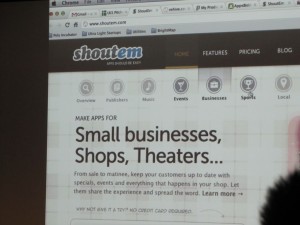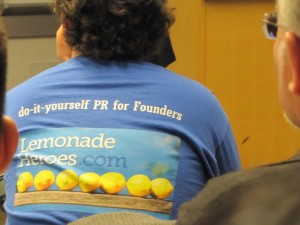 |
| Blog Maverick |
It turns out that my post last week about item #11 on Mark Cuban’s list of 12 Rules for Startups — “Never Hire a PR Firm” — set off a firestorm that prompted a more nuanced response from Mr. Cuban.
In his expanded view, Mr. Cuban did not disavow his disdain for the PR industry. In fact, he even attempted to school the PR community by drafting a sample pitch letter. More on that in a moment.
My first post mentioning Mark Cuban came in August 2005 during the nascent days of this blog. A then-ascendent New York Times business reporter named Andrew Ross Sorkin had just published a less-than-flattering profile piece on the founder of Broadcast.com and owner of the Dallas Mavericks. As a fellow blogger and admirer of Mr. Cuban, I dashed off an email to him early that morning offering some free advice on what he might do to set the record straight.
 |
| Andrew Ross Sorkin |
I didn’t hear back, but about 90 minutes later, a line-by-line retort of Mr. Sorkin’s story appeared on his blog. It turns out the interview was conducted via email, so Cuban simply reposted the unedited Q&A, adding his own clarifying remarks. (Very cool early example of “We the Media.”)
Taking a page from the newly crowned NBA champ, I thought I would deconstruct his less-than-ebullient take on the PR profession, at least as it relates to providing value for the startup community.
Mr. Cuban:
“The first problem with hiring a PR firm is cost. Cash is always in short supply in startups. Given all the potential places that you need cash in a startup, is the company better served having that cash available to potentially keep the company alive another day, week or month ? Or hiring a PR person? I would rather have the cash.”
In effect, Mr. Cuban is correct. When should a startup consider retaining PR counsel and why: for initial positioning, funding news, product launch, partnerships…? The cost, however, will vary from agency to agency, and often is considerably less compared to other marketing disciplines. A small consultancy can run as little as $5,000/month, solo practitioners even less. Mid-sized agencies tend to go for $10K+/month, and larger agencies $15-20K+. (I’m generalizing here.)
Mr. Cuban:
“The next issue is time. The thing about PR people is this: while they may have great contacts and they can get articles placed, they are not capable of doing a vulcan mind meld. They don’t automatically know all the elements about your business that you want to convey to media, partners, customers, potential employees and even potential investors.”
 |
| Tipping Point’s Art Chang Judges Ultralight Startups |
Yes, it’s can be a time sync to have to continuously educate a third-party vendor on a startup’s underlying technology, its audience, business goals, etc.
However, as I said in the comments section of his post, the startup should hire a rep who’s a quick study and will take the time to fully understand the competitive landscape, what distinguishes the startup’s product or service, and most importantly, what keeps the founders up at night. This is where most firms fall down.
The very best in our business will fully immerse themselves in the client’s DNA, freeing up the founders to build the business, while leaving the communications piece to the communications professionals.
Mr. Cuban:
“But the reality is that for the vast majority of startups, particularly tech related startups, most of the media that is going to benefit you out of the gate is trade related or local media. And these people are ALWAYS looking for stories to write. They want to hear from unique companies.”
 |
| Shoutem Showcased at Ultralight Startups Event Jan 12 |
Not necessarily. Tech trades, bloggers and even local media are not “always” looking for stories. And if the are, they tend nowadays to be primarily influenced by those whom they follow on Twitter and Google+, their Facebook friends, and their RSS readers and social news aggregators like News.me and Zite. An email from the founder of a cool new tech start-up, no matter how cogent or compelling, will rarely be opened. In-demand tech journos received hundreds a day.
A seasoned PR professional may have represented many startups and thus be known by the reporter. Who stands a better chance of gaining traction: an unrecognized founder of an unbranded and untested company or the PR person with whom the reporter has worked before?
Mr. Cuban:
“It’s amazing how often a simple email to a writer for a trade publication or local media will get a response. The key to getting a response is being short, sweet , hyperbole free and to the point. You have to sell your differentiation in a paragraph.
Subject : Tracking Traffic to Reduce Vacancies
Dear Real Estate Industry Writer,
My name is Mark Cuban. I would love to tell you more about our company motionloft.com. We have internally developed a sensor that when placed on the side of a building can track in real time the number of people and cars that pass by. Motionloft is being used by building owners in San Francisco and New York to lease space by showing potential tenants the exact amount of foot traffic in front of a store location. Its being used by tenants to determine the best time to open, close and to offer specific products in services.
In one test case we would love to share with you, a tenant decided to rent a store front and go against the conventional wisdom of the area and open for lunch…with great results. They made this decision based exclusively on the data provided by motionloft.com
If you would like to see more information about motionloft.com and how your readers could benefit, just let me know!
all the best
mark
Nice pitch, Mark, but it ain’t happening for you. Yes, if that pitch were coming from the owner of The Dallas Mavs, as opposed to Joe Startup, it might get an airing. To your credit, there’s much good in the query including a lack of hyperbole and rhetoric, brevity and a positive, conversational tone. These are sorely missing in many of today’s PR pitches.
 |
| Robert Scoble & Michael Arrington |
Still, the reality is that tech journos are drowning in hundreds of daily story suggestions — mostly irrelevant — but many from pathbreaking companies whose products or services actually merit editorial consideration.
The ability to capture the limited bandwidth of a tech or startup beat reporter takes time, trust, perseverance, ingenuity and frankly, a little luck. Clearly a company’s co-founder has better things to do with his or her time.
Mark Cuban:
So back to startups hiring a PR firm. Yes, you can get there from here with a PR firm, but im a believer that you accomplish much, much more with direct relationships than by using an intermediary. And that cash you keep in the bank can be the difference between staying alive as a small business, or not.
 |
| Spotted at Ultralight Startups Showcase in NYC |
As I said in my initial post and in the comment section on your blog, it matters little who’s opening the doors to reporters and digital influencers. In fact, I agree that it’s preferable to have the client interface directly with the journalist. We’re perfectly happy to remain in the background, providing advance prep, positioning and the narrative. We’re also there for the client who’s not familiar with the delicate dance that exists between the newsmaker and journalist, and more importantly, what it takes to tango.
What value can one place on the PR counselor who prevents a journalist from skewering the client’s business or POV, or one who is so passionate, articulate and infectious that the client can sleep at night knowing that his or her interests are well represented? What would you pay for that, Mark?
Visit our site Start Up Mentor for any Startup Help
Visit our site Start Up Mentor for any Startup Help
Visit our site Start Up Mentor for any Startup Help
<span><span>Thanks</span></span><span><span> </span></span><span><span>for the</span><span> </span><span>article</span></span><span><span>.</span></span><span><span> </span></span><span><span>Very</span></span><span><span> </span></span><span><span>interesting</span></span><span><span>.</span></span><span><span> essay writing </span></span>